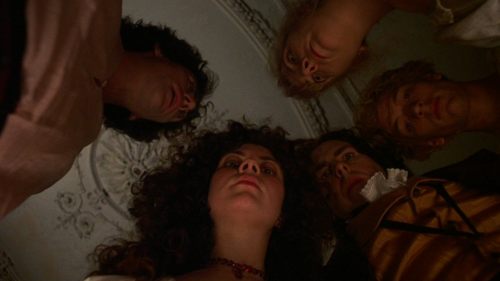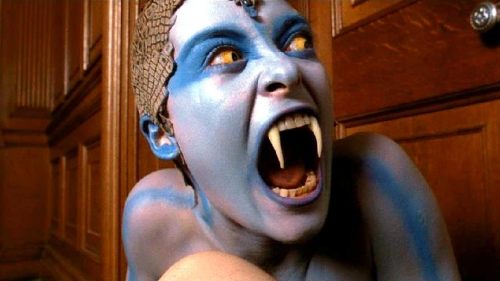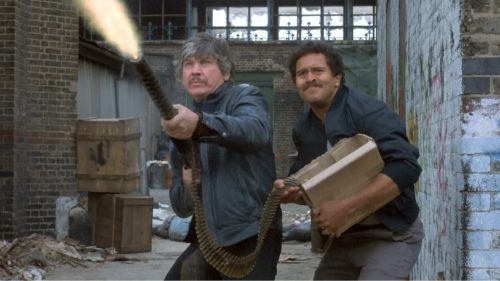Don’t Panic: THE DEVILS Is An Exquisitely Powerful And Relevant Masterpiece
Much has been made of the suppression of Ken Russell's 1971 masterpiece The Devils, with the panic regarding its content effectively mirroring the similar concepts of hysteria within the film itself. For those who have had the privilege of experiencing Russell's film, The Devils remains as powerful and woefully relevant today as it was upon its initial release. Perhaps it's not the marriage of sex, violence, and religion that Warner Bros. should be concerned about, but the idea that the film could inspire so much socio-political reflection - WB's suppression of the film feels like primitive thought-policing and artistic censorship, withholding a vital piece of cinema from the public lest it do them the service of inspiring critical thought.
Based in part on both Aldous Huxley's 1952 book The Devils of Loudun and John Whiting's 1960 play The Devils (both in turn based on actual events), Russell's film is a ferocious, striking piece of cinema with an equally fierce performance from Oliver Reed as Father Urbain Grandier, a narcissistic, pensive priest with a knack for disregarding his celibate vows - a liberal man for his time and place, who seeks to defend the fortified city of Loudun from the encroachment of Cardinal Richelieu, who believes that the protestant faith should be effectively suppressed to prevent an uprising. Richelieu perceives a potential threat to the monarchy, and thus to himself as he pulls the eccentric King Louis XIII's strings. But with the governor of Loudun recently deceased, Richelieu rightly senses cracks in the city's walls and seizes on the opportunistic moment of transition as Grandier moves into power.
Those cracks quickly yield fractures when the abbess of the Ursuline convent in Loudun seeks Grandier's service as their new confessor and is promptly rejected. The hunchbacked Sister Jeanne des Anges is incredibly insecure and repressed both morally and sexually, her inhibitions resulting in manic quirks portrayed with stunning abandon by the great Vanessa Redgrave. Jeanne's romantic and sexual delusions regarding Grandier manifest in the literal rejection of his services to the convent, breeding an exquisite psychosis in the Sister and offering the perfect foundation for the hellacious hysteria that follows.
It isn't long before Jeanne accuses Grandier of bewitching her and signing a pact with the devil and his demonic cohorts, with the sisters in her convent eagerly following suit - allowing for Richelieu to step in and quash his perceived threat in the town by putting Grandier on trial.
It's not the first recorded witch hunt in history and it was far from the last, but The Devils paints a startling picture of collective hysteria, and yet offers few answers for why this baffling phenomenon exists - and persists. It is instead a gorgeously horrific portrait of the fear-driven and repressive behaviors that breed true terror. Hysteria arises from a perfect storm of elements: Sister Jeanne's personal grudges, petty jealousies, and mental deficiencies dangerously marry a larger, socio-political and religious issue, from the literal aims of Richelieu and his ilk to the more nebulous feelings of fear, repression, and paranoia permeating the social consciousness. These perfect storms struck in Salem, in America during the Cold War and again in the late '80s and early '90s with Satanic Panic. When a nation collectively feels threatened by some faceless, nameless threat we displace our irrational fears onto that which is equally irrational, whether it's the Russians or some vague generalization of terrorism or the devil himself.
The nuns of Loudun are based on real people and occurrences, but they also serve as a cautionary tale for perpetual cycles of collective hysteria and the mass fear that induces such deranged behavior. Grandier's story is one of perfect, terrible martyrdom - the irony is breathtaking but obvious: those who profess true religious devotion use their faith in acts of revenge, suppression, and to obtain or maintain power, while a flawed but faithful man is agonizingly tortured and sent off to burn at the stake. There is a horrible artifice to those who oppose and seek to destroy Grandier - men and women who torturously repress and reject their personal failings and the very human flaws embedded in our design, who strenuously profess their faith to the detriment of their fellow man, judging yet refusing to be judged.
It is not much different from the priests and preachers and faithful men in power we see today whose shameful secrets eventually spill out of closeted existences suffocating from the burden of too many lies. These men who use their faith and social standing as a platform to maneuver themselves into places of power, their personal repression becoming a tool of suppressing many.
Men like Grandier embrace their flaws and learn to reconcile their legitimate moral beliefs with the idea that we may not always practice what we preach, that the ideal is not realistically attainable, but that we do the best we can to help ourselves and others.
The Devils serves as a cautionary tale, not only of the marriage of church and state, but of what happens when certain people are given too much power, and what happens when the hysteria of one becomes the hysteria of many - because we allow it. Hysteria is viral and preys on the most delicate, repressed, and intensely human flaws in our design. The more we repress, the more we nourish the parts of ourselves we reject the most - the parts we despise and refuse to embrace as innate. Our sexuality, our desires, our fetishes, our negative feelings, our perceptibly immoral leanings. Ignoring these parts of ourselves does not make them simply disappear. They continue to exist and persist in our subconscious and - like Richelieu - they wait for the most opportune and sensitive moment to escape, punishing us for our rejection and wreaking havoc like some ill-formed, primitive id.
Just as it was in 1971, The Devils remains an important, vital piece of cinema, not only for what it does and what it says about our society and its shortcomings, but for its genuine beauty. Russell crafted a legitimate masterpiece which marries its themes to its presentation and performance with the effortless grace lacking in its deeply flawed and insidious characters. Reed and Redgrave give perhaps their most intensely perfect performances, and like the perfect confluence of hellacious elements that breed the hysteria within, The Devils is an immaculate congregation of pieces working in exquisite harmony to yield one of the most righteous and radical pieces of cinema ever committed to film.



